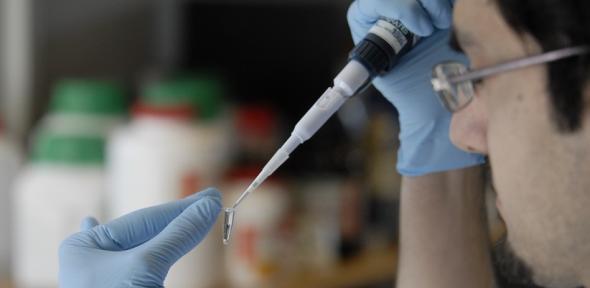
Particular Successes, Highlights & Achievements Arising from ISSF Funding
The Schools of the Biological Sciences (SBS) and Clinical Medicine (SCM) have been fortunate to receive both ISSF1 and ISSF2 funding from the Wellcome Trust.
Early Career Support
The Joint Research Grants scheme
ISSF2 funds renewed our flagship joint support scheme for Early Career Researchers (Wellcome Trust/University/Isaac Newton Trust). During ISSF1/2, 68 applications were made for 37 awards; recipients subsequently received funding from BBSRC, CR-UK, Janelia Farm, Marie Curie and industry. Further notable examples include:
- Dr Matthew Harper (Pharmacology) researched chemotherapy-induced platelet death in thrombosis and thrombocytopenia and received further research funding via a Wellcome Trust seed award and an AstraZeneca studentship;
- Dr Kristian Franze (PDN) worked on the impact of intrinsic neuronal forces on axonal growth and secured funding from the Leverhulme Trust and Isaac Newton Trust;
- Dr Kevin Chalut (SCI) examined the physical biology of early mouse embryogenesis with subsequent funding awarded by BBSRC, the Leverhulme Trust and MRC.
Strategic Recruitments
Strategic recruitment investments in ISSF2 have enabled us to attract outstanding scientists to key strategic areas for the University – notable examples include:
- Professor David Rowitch (University of California (San Francisco)), appointed as the Head of Paediatrics and recently awarded a Wellcome Trust Senior Investigator Award;
- Professor Richard Gilbertson (Comprehensive Cancer Center Director, St Jude Children’s Research Hospital (Memphis)), recruited as the new Director of the Cambridge Cancer Centre;
- Professor Patrick Chinnery (Wellcome Trust Senior Fellow in Clinical Science and NIHR Senior Investigator, University of Newcastle), now Head of Clinical Neurosciences;
- Dr Florian Merkle (Harvard University), recruited as a Principal Investigator of the WT- MRC Institute of Metabolic Science;
- Dr Peter Bull (Oxford/ WT KEMRI programme) and Dr Katerina Artavanis-Tsakonas (Imperial College London), both recruited as part of a strategic investment to build capacity in Parasitology, which represents a major global disease burden.
Platform Technologies
Awards within ISSF2 have enabled us to support work in critical strategic areas, including:
- the upgrade of the 3T-MRI system in the Wolfson Brain Imaging Centre as part of a comprehensive investment in state-of-the-art human imaging including 7T-MRI, PET-MR and clinical hyperpolarised MRI. This major initiative was also supported by the University and an MRC Clinical Research Infrastructure Award;
- the transition of the Behavioural and Clinical Neuroscience Institute to the Institute of Translational Neuroscience (launching 2017);
- a contribution towards initiation of the flagship AR-UK Drug Discovery Institute (one of three nationally), working towards the delivery of personalised targeted medicines for the treatment of neurodegenerative diseases.
Public Engagement
ISSF2 enabled the University to appoint a Public Engagement (PE) Coordinator (SBS/SCM). The Coordinator is working to further integrate PE and Patient and Public Involvement (PPI) and to extend capacity, contributing to grant funding applications, and developing evaluation frameworks for PE activity.
We have funded a number of activities through this strand, including a Public Engagement competition, workshops (on subjects such as genomics research) and a project driven by the Museum of Zoology.
Facilitating Cross-Disciplinary Collaborations
i. Junior Interdisciplinary Fellowship
ISSF2 funds renewed this highly successful scheme for post-doctoral researchers in the Physical Sciences working on problems in Biomedical Sciences (or vice versa). To date, 19 awards across ISSF1/2 have led to extensive collaborations across disciplinary boundaries, and to new joint projects both within Cambridge and with other research institutes such as Deutsches Zentrum für Neurodegenerative Erkrankungen (DZNE) (Bonn), Nara Institute of Science and Technology (NAIST) (Japan), Sanger Institute and UCL. Particular highlights have included:
- Funding to Dr Brochu (Departments of Oncology and Physics), who explored the use of advanced Monte-Carlo computational techniques to address radiation toxicity in radiotherapy patients, resulting in a highly successful collaboration with CERN;
- Dr Achouri (Departments of Physics and Physiology, Development & Neuroscience (PDN)), who investigated the mechanisms involved in embryo development, is now collaborating with the University of Manchester.
ii. Bioinformatics Fellowship
ISSF2 enabled the first appointment to a fellowship for Capacity Building in Bioinformatics for Translational Clinical Research to Dr Charlesworth in late 2015.
iii. Workshops Programmes
ISSF2 has supported 8 cross-disciplinary workshops which bring together researchers in the bio-medical, arts and humanities and social sciences, including work on anti-microbial resistance, bio-medical policy making, public health and political economy, stem cells and society and the ethics of open innovation.
We have also funded a project on the digitization of medical records and another study examining the impact of DNA-related patent protection.
Additional Commitments
In response to the unprecedented Ebola outbreak in 2015, we awarded ISSF2 funds to Professor Ian Goodfellow (working with Public Health England), enabling him to make two trips to Sierra Leone.
A new infectious diseases laboratory at the University of Makeni has evolved from a temporary facility at the Mateneh Ebola Treatment Centre, set up by Professor Goodfellow in April 2015. This facility will work to improve Sierra Leone’s resilience to future epidemics.
